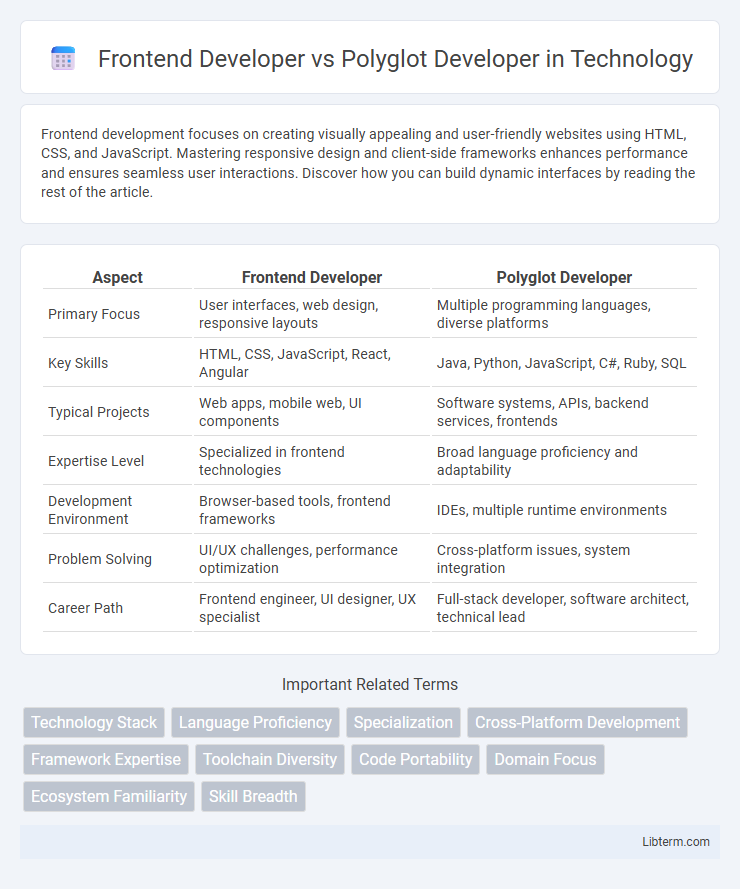Frontend development focuses on creating visually appealing and user-friendly websites using HTML, CSS, and JavaScript. Mastering responsive design and client-side frameworks enhances performance and ensures seamless user interactions. Discover how you can build dynamic interfaces by reading the rest of the article.
Table of Comparison
| Aspect | Frontend Developer | Polyglot Developer |
|---|---|---|
| Primary Focus | User interfaces, web design, responsive layouts | Multiple programming languages, diverse platforms |
| Key Skills | HTML, CSS, JavaScript, React, Angular | Java, Python, JavaScript, C#, Ruby, SQL |
| Typical Projects | Web apps, mobile web, UI components | Software systems, APIs, backend services, frontends |
| Expertise Level | Specialized in frontend technologies | Broad language proficiency and adaptability |
| Development Environment | Browser-based tools, frontend frameworks | IDEs, multiple runtime environments |
| Problem Solving | UI/UX challenges, performance optimization | Cross-platform issues, system integration |
| Career Path | Frontend engineer, UI designer, UX specialist | Full-stack developer, software architect, technical lead |
Introduction: Defining Frontend and Polyglot Developers
Frontend Developers specialize in creating user interfaces using languages like HTML, CSS, and JavaScript, focusing on designing responsive and interactive web applications. Polyglot Developers possess proficiency in multiple programming languages, enabling them to work across various technology stacks and adapt to diverse development environments. Understanding these roles highlights the distinction between specialized front-end expertise and versatile, language-agnostic development skills.
Core Responsibilities of a Frontend Developer
Frontend developers specialize in designing and implementing user interfaces using HTML, CSS, and JavaScript frameworks like React or Angular, ensuring seamless user experiences and responsive designs. Their core responsibilities include translating design prototypes into interactive web pages, optimizing performance across devices, and maintaining cross-browser compatibility. Unlike polyglot developers who handle multiple programming languages and domains, frontend developers focus primarily on client-side development and UI/UX enhancement.
Core Responsibilities of a Polyglot Developer
Polyglot Developers specialize in writing code across multiple programming languages, enabling seamless integration and optimized performance in diverse technological environments. They focus on selecting the most effective languages and frameworks for specific project requirements, enhancing software scalability and maintainability. Core responsibilities include cross-platform application development, managing interoperability between systems, and continuous learning to stay proficient in emerging programming technologies.
Skill Set Comparison: Frontend vs Polyglot
Frontend developers specialize in HTML, CSS, JavaScript, and frameworks such as React or Angular to build user interfaces and enhance user experience. Polyglot developers possess proficiency in multiple programming languages, including front-end and back-end technologies like Python, Java, and SQL, enabling versatility across different system layers. The skill set for frontend roles emphasizes UI/UX design and responsive design principles, while polyglots require adaptability in syntax, semantics, and integration strategies across diverse programming environments.
Flexibility and Adaptability in Development Roles
Frontend developers specialize in building user interfaces using technologies like HTML, CSS, and JavaScript, ensuring seamless user experiences across devices. Polyglot developers possess proficiency in multiple programming languages and frameworks, enabling them to tackle diverse projects ranging from frontend to backend development effectively. This versatility enhances flexibility and adaptability, allowing polyglot developers to pivot between roles and technologies rapidly, whereas frontend developers provide deep expertise within a focused domain.
Learning Curve and Growth Opportunities
Frontend developers specialize in technologies like HTML, CSS, and JavaScript, offering a focused learning curve with rapid skill acquisition and immediate project impact. Polyglot developers master multiple programming languages and paradigms, facing a steeper learning curve but gaining versatility and access to diverse roles across web, mobile, and backend development. Growth opportunities for frontend developers include UI/UX specialization and frontend architecture, while polyglot developers can advance into system design, full-stack development, and cross-platform engineering leadership.
Career Pathways and Industry Demand
Frontend Developers specialize in building user interfaces using technologies like HTML, CSS, JavaScript, and frameworks such as React or Angular, making them essential in industries centered on web and mobile applications. Polyglot Developers possess proficiency in multiple programming languages and frameworks, enabling them to navigate diverse technology stacks and adapt to various project requirements, which is highly valued in startups and companies with heterogeneous tech environments. Career pathways for Frontend Developers often lead to roles like UI/UX Designer, Frontend Architect, or Product Manager, while Polyglot Developers can advance toward Full-Stack Developer, Technical Lead, or Solutions Architect positions, reflecting their broad technical expertise and versatility.
Collaboration and Team Dynamics
Frontend developers specialize in crafting user interfaces with expertise in HTML, CSS, and JavaScript, enabling seamless collaboration within design and UX teams. Polyglot developers possess proficiency in multiple programming languages, enhancing adaptability and facilitating communication across diverse technical teams. Their combined skill sets optimize team dynamics by bridging frontend requirements with backend development, promoting efficient project workflows and innovation.
Salary Expectations and Job Market Trends
Frontend Developers typically earn an average salary ranging from $70,000 to $120,000 annually, driven by high demand for specialized skills in HTML, CSS, JavaScript, and frameworks like React or Angular. Polyglot Developers, proficient in multiple programming languages such as Python, Java, and Ruby, command higher salary brackets typically between $90,000 and $140,000 due to their versatility and ability to handle diverse projects across different tech stacks. Job market trends indicate sustained growth for Frontend Developers fueled by increasing web and mobile app development, while Polyglot Developers benefit from expanding opportunities in complex systems integration and full-stack development roles.
Choosing the Right Path: Which Developer Are You?
Choosing the right path between a Frontend Developer and a Polyglot Developer depends on your career goals and technical interests. Frontend Developers specialize in crafting user interfaces using HTML, CSS, and JavaScript frameworks like React or Angular, focusing on seamless user experience and visual design. Polyglot Developers excel in multiple programming languages and frameworks across front-end and back-end, enabling versatility in solving complex problems and adapting to diverse project requirements.
Frontend Developer Infographic

 libterm.com
libterm.com